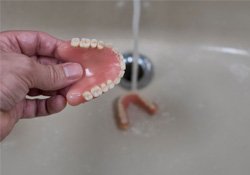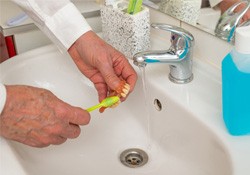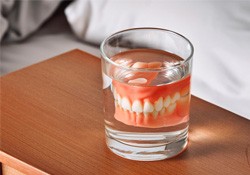Dentures – Newington, CT
Convenient Full-Arch Tooth Replacement

If you have lost all or most of your teeth, you may be considering your tooth replacement options. Full dentures could be right for you. This type of prosthetic has been around for generations; dentures have helped countless people to regain a confident smile and once again enjoy all of their favorite foods. On this page, you will learn more about what dentures are and how they may benefit you. When you are ready to talk to a dental professional about replacing your lost teeth, contact our practice. We are eager to serve you!
What Are Dentures?

A full denture is a prosthetic that is designed to replace an entire arch of missing teeth (all the bottom or all the top teeth). It consists of a gum-colored base that supports a row of artificial teeth, which are usually made out of acrylic or porcelain. A mild adhesive or natural suction helps a denture to remain in the mouth during eating and speaking.
Benefits of Dentures

If you have multiple missing teeth, you may face a number of daily challenges. For example, you may lack the confidence you once had, and it may be difficult for you to eat easily and speak clearly. Dentures can address all of those issues. They offer a number of outstanding benefits that have the potential to improve your daily quality of life and support your overall wellness. Continue reading below to discover some of the specific ways in which they might be able to help you.
Psychological Benefits

Many people are surprised by the profound effects that tooth loss can have on their mental wellness. You might find that you tend to isolate yourself from social situations due to feelings of self-consciousness about the appearance of your smile or your dietary restrictions. As a result, you may feel lonely and have negative thoughts about yourself.
Dentures might be able to play a role in helping you “get back out there,” so to speak. By improving your appearance and oral functionality, they may just allow you to feel like your old self again.
Clearer Enunciation

Clear speech is the result of a series of interactions between the teeth, tongue, and other oral structures. Without your teeth, it might be challenging for you to enunciate certain sounds.
When you first get dentures, it is possible that you will develop a slight lisp. After some practice, though, that issue should disappear. In fact, most people with dentures find that speaking and enunciating are ultimately easier than they were before they got their prosthetic.
Improves Nutrition

In order to look and feel your best, you should consume a balanced diet that is full of nutrient-rich foods. Unfortunately, missing teeth can pose problems when it comes to eating things like fresh veggies, lean meats, and other foods that are known to support overall wellness.
The good news is that dentures can restore your ability to eat a wide variety of foods. Once you adapt to eating with your prosthetic, there will be very few things that you cannot eat.
Preserves Oral Health

If you still have some of your natural teeth, dentures might be able to benefit them in a couple of ways:
- Dentures can serve as placeholders that prevent your natural teeth from drifting out of place. This can preserve your bite and possibly reduce the risk of future tooth loss.
- Dentures can bear some of the stresses of chewing. By allowing you to distribute food evenly across your mouth, dentures may reduce wear and tear on your natural teeth.
Expands Opportunity

It might surprise you to learn that your oral health has the potential to play a significant role in your career success. Poor oral health and missing teeth may give others the wrong impression about you. A full, attractive, and confident smile, on the other hand, can convey the idea that you are youthful, approachable, and successful. As a result, you may find it easier to establish positive relationships with coworkers, clients, and prospective employers.
How Do They Work?

The denture process starts with a restorative consultation with one of our doctors. They will evaluate your oral health and explain the pros and cons of each of your treatment options. If you decide to get conventional dentures, you may need to undergo some extractions or other preparatory treatment before you can receive your prosthetic.
Once you have recovered from any necessary procedures, our team will take impressions of your mouth. Those impressions, along with detailed notes about the size, shape, and color of your new teeth, will be forwarded to a trustworthy dental laboratory. The technicians at the laboratory will fabricate your denture and send it back to us.
Once you start wearing your denture, it may take a few weeks to get used to it. After you adapt, however, you should be quite comfortable and confident when you are wearing it.
Indications for Dentures

Dentures may be an ideal solution for you if you have extensive or complex dental problems, such as loose teeth, red or swollen gums, constant toothaches, or many missing teeth. Many patients who have suffered tooth loss choose dentures because they are a simple and convenient way to replace lost teeth. They are a popular option among individuals who do not have the circumstances to receive dental implants.
Understanding the Cost of Dentures

The cost of dentures in Newington depends on the materials used to make your prosthetic, how your insurance coverage applies, and other factors. We will be sure to give you a candid estimate for the price of your prosthetic during you consultation. We are also ready to help you explore payment options, such as low-interest financing.
Factors that Affect the Cost of Dentures

There are a few factors that affect the cost of dentures, including:
- Preliminary treatment. Some patients require extractions, gum disease therapy, or other procedures before they are ready to receive dentures.
- The base of dentures is usually constructed of acrylic. There are different types of acrylic, and the type used for your prosthetic will have a bearing on cost. The denture’s teeth may be made out of acrylic or porcelain, which have different price points.
- The type of denture. Full dentures, partial dentures, and implant dentures can vary significantly in their prices.
If you ever come across a “bargain” on dentures that seems too good to be true, caution is in order. The quality of your final prosthetic might not be what you were hoping for.
Are Implant Dentures More Expensive?

Yes, implant dentures in Newington cost more upfront than traditional dentures. The higher price is due to the much more complex and time-consuming procedure, which requires a high level of skill as well as extra materials.
Although implant dentures cost more, most patients who choose them have no regrets about their decision. Such prosthetics are much sturdier than traditional dentures. Plus, because an implant denture has the potential to last for many years, it is a better value than traditional dentures, which usually have to be replaced every 5 – 7 years or so.
Does Dental Insurance Cover Dentures?

Most dental insurance plans classify dentures as a “major procedure,” which means that around 50% of their cost might be covered, up to the amount of a policy’s annual maximum. Our practice is happy to help you navigate your benefits; we can let you know exactly how your policy applies and what you can do to get the most out of it. We are even in-network with several major plans, which can help you save even more.
Other Options for Making Dentures Affordable

As your denture dentist in Newington, we want you to be able to afford your prosthetic! That is why, in addition to helping you file your insurance claims, we offer other provisions to make the cost of your care more manageable:
- You may qualify for financing through CareCredit, a third-party lender that offers low-interest and no-interest payment plans for medical and dental services.
- Essential Dental Plan. This discount plan can help you save on the cost of virtually all the services we offer.
Would you like to learn more about dentures and how they may fit into your budget? Contact our friendly team today to schedule a consultation. We look forward to serving you!
Who Is a Good Candidate for Dentures?
 Dentures are a viable solution for almost anyone who has suffered the loss of multiple teeth. They have the potential to significantly improve your quality of life! When you visit us for your restorative consultation, we will evaluate your situation and make a personalized treatment recommendation. Even if you are not a good candidate for dentures right away, you might become one after restorative treatment to improve the health of your gum tissue or underlying bone structure.
Dentures are a viable solution for almost anyone who has suffered the loss of multiple teeth. They have the potential to significantly improve your quality of life! When you visit us for your restorative consultation, we will evaluate your situation and make a personalized treatment recommendation. Even if you are not a good candidate for dentures right away, you might become one after restorative treatment to improve the health of your gum tissue or underlying bone structure.
Effects of Missing Teeth
 Various circumstances can lead to tooth loss, including gum disease, injury, decay, and some illnesses. Regardless of why you are missing teeth, it is important that you replace them as soon as you can. Failure to do so may result in some unpleasant consequences, such as:
Various circumstances can lead to tooth loss, including gum disease, injury, decay, and some illnesses. Regardless of why you are missing teeth, it is important that you replace them as soon as you can. Failure to do so may result in some unpleasant consequences, such as:
- Limited chewing ability. You might not be able to enjoy your favorite foods or eat a balanced diet.
- Aesthetic issues. Your cheeks may look sunken, and you might feel a bit embarrassed to smile.
- Low self-esteem. Some people with extensive tooth loss isolate themselves due to the emotional consequences of their situation.
Fortunately, dentures can help to address such issues.
What Qualifies You for Dentures?
 Dentures may be right for you if:
Dentures may be right for you if:
- If you have lost all or most of your teeth.
- Your remaining natural teeth are in poor condition.
- Your gums are free of active infections.
- Your jawbone is healthy enough to support dentures.
- You are looking for a budget-friendly way to rebuild your smile.
During your consultation, our team will assess the specifics of your case and let you know for sure whether we believe dentures are the right treatment for you.
Alternative Tooth Replacement Options
 If dentures are not a fit for you at this time, you might be a candidate for another form of tooth replacement:
If dentures are not a fit for you at this time, you might be a candidate for another form of tooth replacement:
- Fixed bridge. A traditional fixed bridge uses crowns attached to the natural teeth. They support one or more artificial teeth between them. A bridge is a great option for many patients who have lost just one or a few teeth and who are looking for a quick and sturdy way to recomplete their smile.
- Dental implants. Dental implants are titanium cylinders, or posts, that act as prosthetic tooth roots. Once they are placed in the jawbone, they can provide a strong base of support for crowns, bridges, and dentures. They are widely regarded as the best form of tooth replacement.
How Dentures Are Made
 Once you commit to dentures, you can rightly look forward to improved oral function and other benefits. Every denture we provide is custom-made for the patient who will use it. Are you curious about the steps that are necessary in order to produce an attractive and functional prosthetic? Below, you will get an overview of the denture creation process. What you learn might just enhance your appreciation for the beautiful new teeth that will soon be in your possession.
Once you commit to dentures, you can rightly look forward to improved oral function and other benefits. Every denture we provide is custom-made for the patient who will use it. Are you curious about the steps that are necessary in order to produce an attractive and functional prosthetic? Below, you will get an overview of the denture creation process. What you learn might just enhance your appreciation for the beautiful new teeth that will soon be in your possession.
What Are Dentures Made Of?

Dentures consist of two main parts:
- The base of dentures is usually made of gum-colored acrylic. Acrylic can be molded to fit your mouth’s unique shape, and it is durable enough to last for several years. In partial dentures, the base also includes small metal or acrylic attachments that serve to keep the prosthetic in place. In some cases, nylon is used instead of acrylic to create the base of dentures.
- The teeth of dentures are often made of either acrylic or porcelain. Acrylic is a little softer, so it is often the best choice for individuals who still have some natural teeth. Porcelain is typically the material of choice for full-mouth replacement.
The Denture Creation Process

The denture creation process tends to go something like this:
- Our team takes impressions of your mouth. We use a paste that you must bite down on so we can capture an accurate impression of your dental arches. We may also carefully measure your jaw.
- We send the impressions to a dental lab, which can use them as the basis for creating a wax version of your gumline. Then, they use a device called an articulator to place artificial teeth within the wax base.
- You come in for a fitting with the wax-up. This can give us an idea of whether the final denture will fit you and how it will feel in your mouth. We send notes about the fitting to the dental lab and continue to coordinate with them as they work on your final prosthetic.
- Once the denture is done, we make any small final adjustments before you can go off and enjoy your brand-new smile.
Adjusting to Your New Dentures

It might take a few weeks or months to adjust to your new dentures. In the meantime, you could experience some soreness. You could also develop a small lisp. Usually, these issues go away with time and practice. If you notice any persistent or severe problems, please reach out to us. There might be a problem with your prosthetic or your oral health that requires professional attention. We are ready to support you, and we want you to be able to benefit as fully as possible from your dentures!
Dentures Aftercare
 Your dentures can provide you with several years of confident, functional smiles. But they will only serve you well if you take good care of them! It is important that you continue to visit us every six months for a checkup — even if you no longer have any natural teeth. We will inspect your oral tissues, clean and polish your dentures, and look for any signs that they need to be relined or replaced.
Your dentures can provide you with several years of confident, functional smiles. But they will only serve you well if you take good care of them! It is important that you continue to visit us every six months for a checkup — even if you no longer have any natural teeth. We will inspect your oral tissues, clean and polish your dentures, and look for any signs that they need to be relined or replaced.
Aside from attending regular checkups, what else can you do to keep your dentures in good shape? Here are some helpful tips:
Removable Dentures
Remove After Eating

Try to make it your habit to remove your dentures after each meal so you can rinse them off. This removes food debris and helps to prevent the buildup of bacteria and plaque. Keep in mind that you should not use hot water when you rinse your dentures; its high temperature might warp your prosthetic and render it unusable.
Clean Your Restoration

It is important to have a thorough daily cleaning routine for your dentures. Take them out of your mouth, and use a soft-bristled toothbrush or a denture brush to clean all of their surface. You can use mild, unpigmented soap or denture cleanser for this (do not use toothpaste because it could scratch your artificial teeth). Rinse them thoroughly before placing them back in your mouth, or store them in water or a cleansing solution until the next time you wear them.
Keep Your Dentures Safe

Dentures are durable, but they can still easily become damaged if they are mishandled. To minimize the risk of that happening, remove them when you are standing over a folded towel or a sink full of water. If you accidentally drop them, they should have a soft landing.
Additionally, be sure to store your dentures out of the reach of small children and curious pets.
Remove When You Sleep

While it might be tempting to sleep while wearing your dentures, you should not do so. Removing them at night allows you to thoroughly clean both your prosthetic and your mouth. It also helps to promote good circulation in your gums, which can reduce the risk of sores and tissue irritation. Keep your dentures moist overnight by storing them in water or a cleansing solution.
Notice Changes

You should always monitor both your dentures and your mouth. If you notice anything that concerns you, you should contact us for assistance. Here are some good reasons to give us a call:
- Your dentures no longer fit as well as they used to.
- You are experiencing irritation in your mouth.
- You have signs of an oral infection, such as bad breath, pain, or swelling.
- Your dentures have visible damage.
All-on-4 Dentures
 An All-on-4 denture is permanently attached to the implants that support it, so taking care of it is almost like caring for natural teeth. You should have a good routine of twice-daily brushing. Make sure to regularly clean beneath your restoration with a water flosser. You can also use small brushes known as sulcus brushes to keep the areas around your implants clean. Regularly using an antibacterial mouth rinse can be helpful for keeping harmful bacteria at bay.
An All-on-4 denture is permanently attached to the implants that support it, so taking care of it is almost like caring for natural teeth. You should have a good routine of twice-daily brushing. Make sure to regularly clean beneath your restoration with a water flosser. You can also use small brushes known as sulcus brushes to keep the areas around your implants clean. Regularly using an antibacterial mouth rinse can be helpful for keeping harmful bacteria at bay.
Denture FAQs

If you are thinking about getting dentures in Newington, our team is ready to help. Before you come in for your consultation, however, you might want to know more about what you can expect on the road ahead. Below, you will find answers to some of our most frequently asked questions about dentures. If you do not see the information you were specifically looking for, please reach out to us directly so we can personally assist you.
How Long Will You Have to Wait to Get Dentures After Your Teeth Are Pulled?
Your treatment timeline will depend on a few factors, including the type of denture you choose and the state of your oral health. Some patients opt for immediate dentures, which are provided right after extractions. However, immediate dentures may not retain their fit for very long and will eventually have to be replaced by a permanent prosthetic. If you get a traditional denture, you may have to wait 6 – 8 weeks after extractions to get your new teeth. This will allow your mouth and gums time to heal. For implant dentures, you may be able to get implants right after extractions or a few weeks or months later. Once the implants have bonded with your jawbone, you will receive your new teeth.
Will It Hurt to Get Dentures?
If you must get your teeth extracted before you receive dentures, you can expect some soreness, swelling, and bleeding after your procedure. Most people are back to feeling quite normal within a few days to a week. After you get your dentures, your gums may be sore for a time as you adjust to using your new prosthetic. This adjustment period may take weeks or months; it varies from person to person. If you experience any severe or prolonged pain, call your denture dentist in Newington. You might have an underlying oral health issue that requires attention.
Is It Hard to Talk with Dentures?
For most people, their dentures enhance their ability to speak clearly. At first, though, you may notice that you have a lisp or that it is difficult to enunciate certain sounds. After all, your denture will be a foreign object in your mouth, and you are not used to using it as part of your speech. Practice is the key to overcoming any speech difficulties. Reading out loud to yourself, chatting with family and friends, and speaking slowly can all help you during your adjustment period. If you find that your dentures slip out of place while you are speaking, you may need to use a bit of adhesive to keep them where they belong.
What Can You Not Eat with Dentures?
Sticky foods, like gummy candies and peanut butter, might pull your denture out of place. Foods with small pieces, such as popcorn and sesame seeds, can leave debris beneath your prosthetic, which can cause irritation and damage. Hard foods, including raw vegetables and corn on the cob, may damage dentures if you eat them incorrectly. It is best to cut such foods before placing them in your mouth, then move them directly to your molars so you can chew. Chewy foods — for example, tough meats — may also pose a problem. If you dislike the idea of having food limitations with traditional dentures, implant dentures may be a better option for you because they are sturdy enough to handle virtually any food.
Do Dentures Break Easily?
Dentures are designed to be durable; with proper care, they tend to last for 5 – 7 years. However, an accident might cut their lifespan short. Some patients drop their dentures while attempting to clean, insert, or remove them. If they fall on a hard surface, they could chip, crack, or even completely break. That is why it is best to handle your dentures carefully, and try to remove them only when you are standing over a soft surface, such as a folded towel or a sink full of water.
Are Denture Adhesives Safe?
Denture adhesives are generally safe if used as directed. However, keep in mind that some products contain zinc. If you use too much adhesive, you may ingest some of this mineral, which could lead to health complications, including nerve damage.
To stay safe, be sure to remove denture adhesive at the end of the day and thoroughly clean your denture.
If you are allergic to zinc or other common ingredients in denture adhesives, only use products that you are reasonably sure are safe for you.
What Type of Denture Adhesive Should I Use?
There are three main categories of denture adhesive:
- Creams provide a strong hold that lasts all day. They can also create a bit of cushioning for your gum tissue.
- Powders are also quite effective. Plus, due to their makeup, it is easy to just sprinkle a bit on your dentures without overdoing it.
- Strips are very convenient and comfortable. They are also precut and can prevent you from using too much adhesive.
You might need to try a few different adhesive products before you find one that works well for you.
Can I Reline My Dentures Myself?
To “reline” dentures means to add material to their base so they have a more secure fit. You can buy DIY kits to accomplish this, but extreme caution is in order. You may accidentally end up worsening the fit of your dentures or even rendering them unusable. It is best to leave relines to well-trained dental professionals.
Can I Sleep with My Dentures?
When you first get your dentures, you may be advised to wear them for 24 hours, including when you sleep. After that initial period, though, you should remove them at night. This gives your gums a chance to rest and encourages good circulation. Removing your dentures also makes them easier to clean, meaning you can avoid issues like bad breath and infections. Try soaking them in a cleansing solution overnight to get rid of harmful bacteria and keep them fresh.
